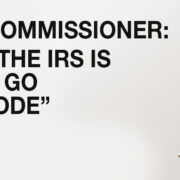IRS Issues Notice Updating Prior Guidance On Taxation Of Cryptocurrency
IRS Issues Notice Updating Prior Guidance On Taxation Of Cryptocurrency
On April 24, 2023 the IRS issued Notice 2023-34 as an update to its previous Notice 2014-21 governing taxation of cryptocurrency.
The IRS in 2014 issued Notice 2014-21 stating that it treats crypto currency as property for tax purposes. At the time this Notice was issued, the IRS recognized that in no legal jurisdiction were digital currencies accepted as legal tender. However, since then foreign jurisdictions have enacted laws that characterize Bitcoin as legal tender. Thus, the sentence in the Background section of Notice 2014-21 stating that virtual currency does not have legal tender status in any jurisdiction is no longer accurate as to Bitcoin.
While Bitcoin receives most of the attention these days, it is only one of hundreds of crypto currencies. Everything discussed with regard to bitcoin taxation applies to all crypto currencies.
Despite Bitcoin’s distinction as being legal tender in some jurisdictions, selling, spending and even exchanging crypto for other tokens all likely have capital gain implications. Likewise, receiving it as compensation or by other means will be ordinary income. Notice 2014-21 has since been supplemented by Revenue Ruling 2019-24 and frequently asked questions (FAQ’s).
Some would think that if bitcoin is property, trades should be tax deferred under the like-kind changes rues of I.R.C. §1031. Under that theory someone who owned Bitcoin could diversify their holdings into Ethereum or Litecoin, and plausibly tell the IRS it created no tax obligations. Unfortunately, the new Tax Cuts & Jobs Act of 2017 does away with that loophole making it clear that “like kind exchanges” which lets people swap an asset for a similar one without triggering a tax obligation are not available for non-real estate assets.
Taxation Of Cryptocurrency
Here are the basic tax rules followed by IRS on specific crypto currency transactions:
- Trading cryptocurrencies produces capital gains or losses, with the latter being able to offset gains and reduce tax.
- Exchanging one cryptocurrency for another — for example, using Ethereum to purchase an altcoin — creates a taxable event. The token is treated as being sold, thus generating capital gains or losses.
- Receiving payments in cryptocurrency in exchange for products or services or as salary is treated as ordinary income at the fair market value of the coin at the time of receipt.
- Spending cryptocurrency is a tax event and may generate capital gains or losses, which can be short-term or long-term. For example, say you bought one coin for $500. If that coin was then worth $700 and you bought a $700 gift card, there is a $200 taxable gain. Depending on the holding period, it could be a short- or long-term capital gain subject to different rates.
- Converting a cryptocurrency to U.S. dollars or another currency at a gain is a taxable event, as it is treated as being sold, thus generating capital gains.
- Air drops are considered ordinary income on the day of the air drop. That value will become the basis of the coin. When it’s sold, exchanged, etc., there will be a capital gain.
- Mining crypto currency is considered ordinary income equal to the fair market value of the coin the day it was successfully mined.
- Initial coin offerings including certain forks do not fall under the IRS’s tax-free treatment for raising capital. Thus, they produce ordinary income to individuals and businesses alike.
Given the limited guidance by IRS, there are still tax positions that can be advocated or structured so that taxpayers dealing with cryptocurrency can defer gains and minimize taxes. That is why it is essential you seek qualified tax counsel.
Reporting Cryptocurrency Transactions
Taxpayers who do not properly report the income tax consequences of virtual currency transactions are, when appropriate, liable for tax, penalties and interest. In some cases, taxpayers could be subject to criminal prosecution.
All crypto sells, conversions, payments, donations, and earned income are reportable by U.S. taxpayers. Fortunately, there are tools available that can make reporting easier.
STEP ONE: SCHEDULING YOUR 2022 CRYPTOCURRENCY TRANSCATIONS
Check out the tax tools below that can help you keep records of your crypto transactions to get you ready for tax return preparation: Beartax, Bittax Blox, Cointracker, Cointracking, Cryptotax, Cryptotrader, Koinly, Tokentax and Zenledger.
STEP TWO: SEEING A TAX PROFESSIONAL
Once you have all of your crypto records on hand, you should take them to a tax professional who can help you file your taxes. While you may be tempted to prepare your taxes on your own using tax preparation software, you should see a tax professional as not all crypto transactions are taxable. You should also see a tax professional if you were not compliant in prior years.
The 2022 Form 1040 Makes It Harder For U.S. Taxpayers To Avoid Non-compliance Or Claim Ignorance.
Starting with the 2019 Federal Individual Income Tax Returns, Form includes the following checkbox question:
At any time during 2022, did you receive, sell, send, exchange or otherwise acquire any financial interest in any virtual currency? ◊ Yes ◊ No
This requirement is similar to how the IRS includes questions on Schedule B inquiring whether a taxpayer has foreign bank accounts.
Taxpayers who answer “no” and for who the IRS later determines should have answered “yes” could face civil or criminal penalties and it could affect their success in having penalties abated for reasonable cause.
Penalties For Filing A False Income Tax Return Or Under-reporting Income
Failure to report all the money you make is a main reason folks end up facing an IRS auditor. Carelessness on your tax return might get you whacked with a 20% penalty. But that’s nothing compared to the 75% civil penalty for willful tax fraud and possibly facing criminal charges of tax evasion that if convicted could land you in jail.
Criminal Fraud – The law defines that any person who willfully attempts in any manner to evade or defeat any tax under the Internal Revenue Code or the payment thereof is, in addition to other penalties provided by law, guilty of a felony and, upon conviction thereof, can be fined not more than $100,000 ($500,000 in the case of a corporation), or imprisoned not more than five years, or both, together with the costs of prosecution (Code Sec. 7201).
The term “willfully” has been interpreted to require a specific intent to violate the law (U.S. v. Pomponio, 429 U.S. 10 (1976)). The term “willfulness” is defined as the voluntary, intentional violation of a known legal duty (Cheek v. U.S., 498 U.S. 192 (1991)).
And even if the IRS is not looking to put you in jail, they will be looking to hit you with a big tax bill with hefty penalties.
Civil Fraud – Normally the IRS will impose a negligence penalty of 20% of the underpayment of tax (Code Sec. 6662(b)(1) and 6662(b)(2)) but violations of the Internal Revenue Code with the intent to evade income taxes may result in a civil fraud penalty. In lieu of the 20% negligence penalty, the civil fraud penalty is 75% of the underpayment of tax (Code Sec. 6663). The imposition of the Civil Fraud Penalty essentially doubles your liability to the IRS!
What Should You Do?
The IRS has not yet announced a specific tax amnesty for people who failed to report their gains and income from Bitcoin and other virtual currencies but under the existing Voluntary Disclosure Program, non-compliant taxpayers can come forward to avoid criminal prosecution and negotiate lower penalties.
With only several hundred people reporting their crypto gains each year since Bitcoin’s launch, the IRS suspects that many crypto users have been evading taxes by not reporting crypto transactions on their tax returns.
And now that like–exchange treatment is prohibited on non-real estate transactions that occur after 2017, now is the ideal time to be proactive and come forward with voluntary disclosure to lock in your deferred gains through 2017, eliminate your risk for criminal prosecution, and minimize your civil penalties. Don’t delay because once the IRS has targeted you for investigation – even if it is a routine random audit – it will be too late voluntarily come forward. Let the bitcoin tax attorneys at the Law Offices Of Jeffrey B. Kahn, P.C. located in Orange County (Irvine), San Francisco Bay Area (including San Jose and Walnut Creek) and offices elsewhere in California get you qualified into a voluntary disclosure program to avoid criminal prosecution, seek abatement of penalties, and minimize your tax liability. Additionally, if you are involved in cannabis, check out what a cannabis tax attorney can do for you.











 Follow
Follow Follow
Follow